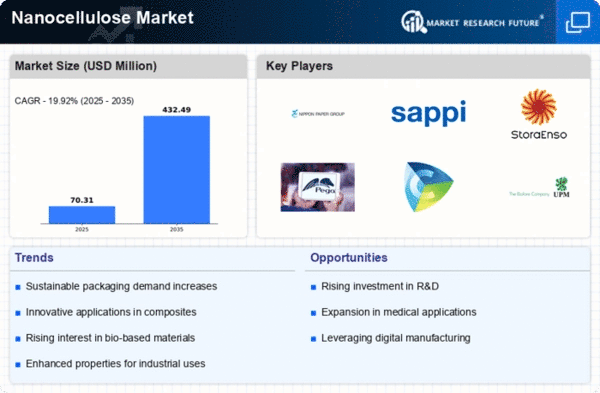Top Industry Leaders in the Nanocellulose Market
 Nanocellulose, a revolutionary material derived from the very essence of trees, is rewriting the rules of industries from packaging to medicine. The global nanocellulose market is a vibrant tapestry woven with established players and nimble startups, all vying for a piece of this transformative technology. Let's delve into the strategies shaping this competitive landscape, the factors influencing market share, and the recent developments propelling the nanocellulose revolution.
Nanocellulose, a revolutionary material derived from the very essence of trees, is rewriting the rules of industries from packaging to medicine. The global nanocellulose market is a vibrant tapestry woven with established players and nimble startups, all vying for a piece of this transformative technology. Let's delve into the strategies shaping this competitive landscape, the factors influencing market share, and the recent developments propelling the nanocellulose revolution.
Strategies for Nanocellulose Domination:
-
Product Diversification: Leading players like UPM and Stora Enso are developing a diverse range of nanocellulose products, from high-performance reinforcement materials for composites to biocompatible films for medical applications. This caters to a wider customer base and unlocks new revenue streams. -
Sustainability Focus: With environmental concerns rising, companies like Kruger Products and Sappi are prioritizing sustainable production processes, using recycled wood or agricultural waste as raw materials. This resonates with eco-conscious consumers and aligns with industry regulations. -
Technological Innovation: The nanocellulose space is brimming with innovation. Companies like CelluForce are pioneering novel production methods like enzymatic hydrolysis, enhancing efficiency and reducing environmental impact. Others like RISE are focusing on functionalizing nanocellulose with specific properties, expanding its applicability. -
Strategic Partnerships and Collaborations: Collaboration is key in this nascent market. Companies like Metsä Tissue and Sateri are partnering with research institutions, universities, and even end-user industries to accelerate innovation and develop commercially viable applications. -
Geographical Expansion: Established players like Georgia-Pacific are entering new markets, particularly in Asia-Pacific, driven by its high growth potential. This capitalizes on existing expertise and expands reach to booming economies.
Factors Influencing Market Share:
-
Production Capacity and Cost: Companies with large-scale production facilities like Domtar have a cost advantage and can cater to bulk orders. Efficient production processes like continuous extrusion, employed by Borregaard, further optimize costs and gain market share. -
Product Quality and Consistency: High-quality nanocellulose with consistent properties is crucial for product performance and customer satisfaction. Companies like Rayonier Advanced Materials excel in this area, ensuring reliable and predictable performance. -
Regulation and Standards: Stringent environmental regulations and emerging industry standards can impact production costs and market access. Companies like Kelheim Fibres actively engage with regulatory bodies to ensure compliance and navigate the evolving landscape. -
Brand Reputation and Sustainability Initiatives: Companies with a strong commitment to sustainability and a transparent track record of responsible practices, like Lenzing, attract environmentally conscious clients and investors. -
Regional Market Dynamics: The adoption of nanocellulose varies globally. Developed economies with stricter regulations and higher environmental awareness are leading the way, while emerging markets offer significant growth potential as infrastructure and awareness improve.
Key Companies in the Nanocellulose market include
Daicel Finchem Ltd (Japan)
Nippon Paper Industries C0., Ltd (Japan)
Borregard (Norway)
Celluforce (U.S)
Sappi Ltd (South Africa)
Kruger Inc. (Canada)
Stora Enso (Finland)
American Process Inc.(U.S)
UPM (Finland)
Rettenmaier & Sohne GmbH + Co KG (Germany) and others.
Recent Developments:
In September 2020, Celluforce announced the signing of a commercial agreement with a multinational company operating in the cosmetics sector for the exclusive supply of CNC for the next 10 years. The company also estimated that it will require the construction of a new, larger plant shortly to meet the demand from this agreement. The MNC is granted exclusivity for the commercialization of CNC-based cosmetics products and is projected to introduce new products gradually throughout the contract.
February 2020: GranBio Technologies, a subsidiary of GranBio announced the signing of a supply partnership with Birla Carbon, an Indian company for the supply of biomass-based for the replacement of carbon black, an oil by-product used in the tire & rubber industry.










